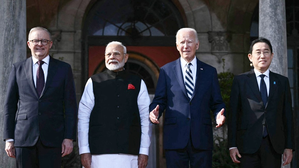Quad leaders decry N. Korea missile launches, reaffirm ‘complete’ peninsula denuclearisation goal
Washington: The leaders of the US, India, Japan and Australia have denounced North Korea’s “destabilizing” missile launches and its nuclear program and reaffirmed their commitment to the “complete” denuclearization of the Korean Peninsula.
Prime Minister Narendra Modi, US President Joe Biden, Japanese PM Fumio Kishida and Australian PM Anthony Albanese issued a joint statement on Saturday after the four countries’ fourth in-person Quad summit held in Wilmington, Delaware, reported Yonhap news agency.
The summit came as Pyongyang has recently ratcheted up tensions on the peninsula with its rare disclosure of a uranium enrichment facility, continued weapons tests and launches of trash-filled balloons into South Korea, not to mention tough rhetoric.
“We condemn North Korea’s destabilizing ballistic missile launches and its continued pursuit of nuclear weapons in violation of multiple UN Security Council resolutions (UNSCRs). These launches pose a grave threat to international peace and stability,” the leaders said in the statement, named “the Wilmington Declaration”.
“We urge North Korea to abide by all its obligations under the UNSCRs, refrain from further provocations and engage in substantive dialogue. We reaffirm our commitment to the complete denuclearization of the Korean Peninsula consistent with relevant UNSCRs and call on all countries to fully implement these UNSCRs,” they added.
They stressed the need to prevent any proliferation of nuclear and missile technologies related to North Korea.
“We express our grave concern over North Korea’s use of proliferation networks, malicious cyber activity and workers abroad to fund its unlawful weapons of mass destruction and ballistic missile programs,” they said.
“In that context, we urge all UN Member States to abide by the relevant UNSCRs, including the prohibition on the transfer to North Korea or procurement from North Korea of all arms and related materiel,” the leaders said.
Moreover, they expressed “deep” concerns about countries that are deepening military cooperation with the North, saying that it undermines the global nonproliferation regime.
The leaders also underscored the importance of sanctions enforcement against Pyongyang, noting that a UN expert panel monitoring sanctions violations has been disbanded.
“We reiterate our commitment to continued implementation of the relevant UNSCRs which remain in full force,” they said.
Earlier in the day, Biden and Kishida held a separate bilateral meeting, where Biden recognised improvement in relations between Seoul and Tokyo, long strained over historical feuds.
“He (Biden) also commended the Prime Minister’s courage and conviction in strengthening ties with the Republic of Korea, which enabled the launch of a momentous new era of US-Japan-ROK trilateral cooperation at the historic Camp David Summit in August 2023,” the White House said in a readout. (ROK stands for South Korea’s official name, the Republic of Korea.)
The Camp David summit is the first standalone trilateral meeting among the three countries’ leaders. It produced a series of landmark cooperation agreements, including the “Commitment to Consult” each other in the event of a shared threat.
In their joint statement, Quad leaders also expressed their serious concern over China’s assertiveness in the South China Sea.
“We continue to express our serious concern about the militarization of disputed features, and coercive and intimidating maneuvers in the South China Sea,” they said. “We condemn the dangerous use of coast guard and maritime militia vessels, including increasing use of dangerous manoeuvres,” said the leaders.
For three-way maritime security efforts, the leaders said that the US Coast Guard, Japan Coast Guard, Australian Border Force and Indian Coast Guard plan to launch a first-ever Quad-at-Sea Ship Observer Mission in 2025 to improve interoperability and advance maritime safety in the Indo-Pacific.
They also announced the launch of a “Quad Indo-Pacific Logistics Network” pilot project to pursue shared airlift capacity among their countries and leverage collective logistics strengths in order to support civilian response to natural disasters “more rapidly and efficiently” across the Indo-Pacific.
The next Quad Summit will be hosted by India.








